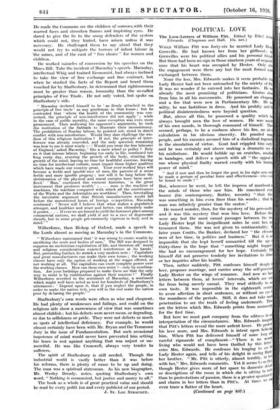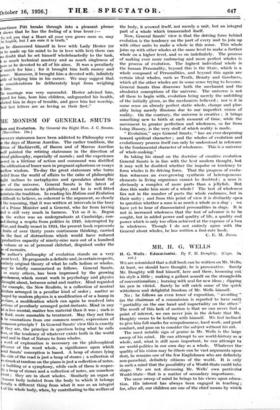POLITICAL LOVE
Wimp; William Pitt was forty-six he married Lady 11e41 Grenville. He had known her from her girlhood ; tie Grenvilles were his political allies and his personal frienib But there had been no sign in those nineteen years of acquaint ante that his heart was occupied by Hester. Only art,
the engagement were there any but the most formal not exchanged between them.
None the less, Mrs. Edwards makes it seem probable t Lady Hester had not been untouched by the society of Pitt It was no wonder if he entered into her fantasies. He already the most promising of politicians. Genius shoe( from him in all his movements. He possesSed an eloque and a fire that were new in Parliamentary life. He witty, he was fastidious in dress. And his probity and political disinterestedness were beyond question.
But, above all this, he possessed a quality which always brought men the love of women. He was mss of his own moods, in thorough command of himself. Tli seemed, perhaps, to be a coolness above his fire, an air calculation in his obvious sincerity. He puzzled man people, and his enemies accused him of a diabolical ingenun in the simulation of virtue. Gout had crippled him early and he was certainly not above making a dramatic use his misfortune. He would hobble up on crutches, swat in bandages, and deliver a speech with all " the appeal one whose physical frailty warred cruelly with his burn power of mind."
" And if now and then he forgot the gout in his right arm w he made a gesture of peculiar force and effectiveness--who co be found to smile ? "
But, wherever he went, he left the impress of manhood the minds of those who saw him. He convinced es hearer (his contemporary, Butler, records) " that then was something in him even finer than his words ; that man was infinitely greater than the orator."
He roused wonder, then, for the mystery of his personality and it was this mystery that won him love. Before t were any but the most casual passages between the t Lady Hester kept the insignificant notes he sent her, treasured them. She was not given to sentimentality. later years Coutts, the Banker, declared her the clew man of her time, in politics and business. But it is impossible that she kept herself unmarried till the age thirty-three in the hope that " something might happen.
She had no encouragement for her hope. Certainly P himself did not preserve tenderly her invitations to dine or her inquiries after his health.
Then, rather suddenly, Pitt confesses himself deeply love, proposes marriage, and carries away the self-posse Lady Hester on the wings of romance. And now we ha letters between them, at lovers' intervals, which are far from being merely casual. They read stiltedly to own taste. It was impossible in the eighteenth centtuf to avow affection in short sentences, or without an eye b the roundness of the periods. Still, it does not take mui penetration to see the truth of feeling underneath. Thep are the letters which Mrs. Edwards prints from manticenfi
for the first time.
But here we must part company from the editress in os
interpretation of the circumstances. Mrs. Edwards imagi that Pitt's letters reveal the more ardent lover. He prote41 his love more, and Mrs. Edwards is intent upon beltevig him. When Pitt has delivered himself of some long 01
careful rigmarole of compliment—" There is no wow living who would not have been thrilled by this letter.
cries Mrs. Edwards. He confesses his longing to see ilis Lady Hester again, and tells of his delight in seeing H' her brother. " Mr. Pitt is utterly, almost terribly, in 1°1t with her," Mrs. Edwards comments. Yet it seems to us th5" though Hester gives more. of her space to domestic detsib or descriptions of the room in which she is sitting to wilt. than to protestations of passion, there is a greater spontaneg. and charm in her letters than in Pitt's. At times we to even trace a flutter of the heart. _ (Continued on page 647.1
;ometinaes Pitt breaks through into a pleasant phrase t shows that he has the feeling of a true lover :-
To tell you that a Heart all, your own grows more so, may be Logick, but I am sure it is truth."
a he discovered himself in love with Lady Hester (or a he made up his mind to be in love with her) there can o doubt that he set himself wholeheartedly to the task, as much technical mastery and as much singleness of se as he devoted to all of his aims. It was a peculiarly match for him ; for it brought him both money and enee. Moreover, it brought him a devoted wife, infinitely ble of helping him in his career. We may suggest that considerations he deliberately kept from weighing him.
he marriage was very successful. Hester advised him, 'gued for him, bore him children, safeguarded his health, forted him in days of trouble, and gave him her worship. eir last letters are as loving as their first."























































 Previous page
Previous page